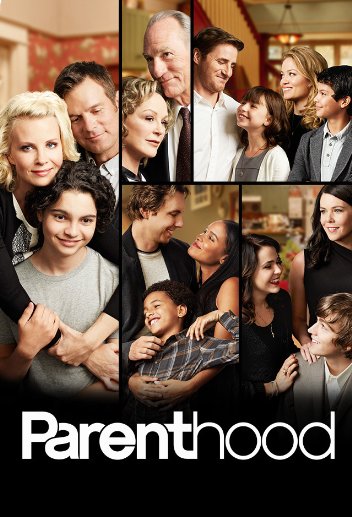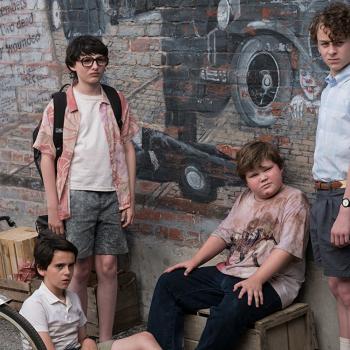After six seasons, Parenthood, the NBC show loved with fervency by a core group of fans (including me) but never able to get over the hump of the TV ratings battle, is over. The show centers around three generations of the Braverman family: Zeek and Camille and their four adult children and those children’s children (in the final season, we got to experience a fourth generation Braverman as well). I almost never missed an episode, actually crying when my husband deleted one from the DVR before I could watch it. The small, genuine moments from everyday family life –the joys and sorrows–made up the centerpiece of the show. Instead of adding big explosions and unrealistic pandering plot lines like most network shows do, Parenthood majored on happenings like the tantrums of young children, the challenges of raising a child with autism, the struggle for balance in a marital relationship, the loss of a job, the building of a family business, a battle with breast cancer, divorce, the healing of a broken marriage, the raising of a teenager. It was sincere–always. We fans believed the characters; the Bravermans were as real as our next-door neighbors.
I grew up as a parent while watching the show. Its pilot episode aired March 2, 2010. By then, I had been a parent to a little girl for a little while. I was kind of flailing, to be honest. I didn’t have a lot of friends who lived near me, I had a high-pressure ministry job that made me feel constantly pulled between work and home, and I had just finished the wonderful and torturous struggle to nurse my daughter. My dad had just died a few months before too. The Bravermans were community to me. And I kept watching through a big move out to Montana, through ending my ministry job, through the birth of my son, through the rebirth of my writing career, through the making of actual in-the-flesh friendships with other moms, through the sleepless nights and the tired days that end all too soon and not soon enough. The Bravermans reminded me to cherish my children. They helped me cultivate joy in the little, ordinary moments of everyday life. They kept making me cry–not through cheap tricks, but through a genuine love and emotion and heart that poured out of the screen. I am a better parent through having watched the Bravermans.
And marriage! Other than Jason Katims’ other show, Friday Night Lights, I don’t think there has been any other show on TV more honoring to the commitment of marriage and the dignity of fighting hard for your relationship. Most of the other shows on TV encourage the “oops, my pants fell off and I had sex with this other attractive person…what can I say…the heart wants what it wants?” approach to marriage (all Shonda Rhimes shows ever, I’m looking at you). Parenthood is different. It cherishes the warm emotions of a healthy marriage, but it acknowledges the hard work that is often required to get to those moments. It honored the importance of growing up and behaving like an adult. The show reminded me often that even when marriage is tough and you walk through challenging seasons with your spouse, you shouldn’t give up (unless maybe your spouse is an alcoholic like Sarah Braverman’s first husband). They reminded me through Zeek and Camille’s early season struggles that marriage matters, that even in the later stages of marriage, it’s worth it to fight for your relationship, to do hard things for your spouse, and to forgive your spouse when they wrong you. Zeek and Camille’s struggle to bring health to their marriage really continued throughout the series, too. They reached a point of reconciliation but that didn’t mean they just rode off into the sunset. There continued to be disagreements, misunderstandings, and just conflict that came about from the union of two very different personalities. But they kept going. They chose to cherish each other.
This season (and last season), the plot arc of Joel and Julia’s conflicted marriage and separation and almost divorce and then reconciliation was believable too. The writers didn’t give us a quick happy ending. Both had wronged each other and it took real forgiveness to overcome that. Perhaps what will remain most memorable to me, however, is the scene in which Joel and Julia realize they need to talk about the romantic relationships they may have had during their separation. Joel says that he is afraid to have this discussion; he is afraid they are still too fragile and will break apart from the conflict. Julia says, quite wisely, that she is afraid not to have the discussion. And so we see them in a future scene, shut up in their car so that their separation-traumatized children don’t have to see them fight, and they are having it out! They recognize that too often in the past, they have stuffed their genuine feelings and the conflicts in their relationship, only to find those things emerging in a really unhealthy way. And so we see them choosing to fight and fight hard because of their love for each other, battling through so that they can come through to the other side more honest, more whole.
Too many shows rely on the superficiality of sexual tension and sexual boundary-breaking for their drama. Getting beautiful people to hop into bed with each other right and left is easy. It doesn’t require hard work on the part of writers and actors. But there is a quieter drama in daily life that has far more interesting things to develop that the hackneyed adultery or “sex with everybody and their cousin” story lines. Which is not to totally dismiss such story lines, but rather to reject how they are often handled. On Parenthood, sometimes adultery did occur, for instance. But it never occurred without acknowledging the very real consequences that emanate from such decisions. And the movement of the show was always toward forgiveness, love, reconciliation–even when a character messed up royally. It just wasn’t an easy, cost-free reconciliation. It was hard-fought and the more beautiful for it.
Show creator, Jason Katims, told TVLine that “the thesis statement of the whole show” is: “No matter what [curve balls] are thrown at you in life, your family helps you get through it.” That includes the final curve ball of the show (which the TVLine article contains spoilers to, FYI).
We need more television shows that don’t run away from the tough things in life, but which help us see that it’s worth it to fight for your family, for your kids, for your spouse. It’s worth the hard work, the lost sleep, the self-sacrifice, the awkward steps outside your comfort zone. These people are worth it. I hope more shows like Parenthood and Friday Night Lights will get made. (If not, there’s always Netflix re-runs to watch again and again.)
What about you? Have you found some TV shows that encourage you in the hard work of marriage and parenting? Or simply to value those commitments for some day in the future? Have you found TV shows that inspire you to care more about others in some way? Did you watch Parenthood?
Photo source: IMDB.com
——————-
Community discussion guidelines:
Because this is a Christian blog, the things I’m talking about will obviously be topics that people feel strongly about in one direction or another. Please keep in mind that this is a place for substantive, respectful conversation. All perspectives are welcome to discuss here as long as all can treat each other with kindness and respect. Please ignore trolls, refuse to engage in personal attacks, and observe the comment policy listed on the right side of the page. Comments that violate these guidelines may be deleted. For those who clearly violate these policies repeatedly, my policy is to issue a warning which, if not regarded, may lead to blacklisting. This is not about censorship, but about creating a healthy, respectful environment for discussion.
P.S. Please also note that I am not a scientist, but a person with expertise in theology and the arts. While I am very interested in the relationship between science and faith, I do not believe I personally will be able to adequately address the many questions that inevitably come up related to science and religion. I encourage you to seek out the writings of theistic or Christian scientists to help with those discussions.
———————-












